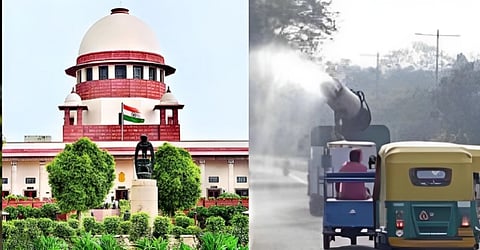

The Supreme Court on Tuesday called for affidavits from governments of Delhi and adjoining states detailing the steps taken by them to curb the air pollution.
A bench comprising Justices S.K. Kaul, Sudhanshu Dhulia and Prashant Kumar Mishra remarked that on ground there is no improvement in air quality and steps shown to control pollution merely happen on paper.
The bench took note of the report filed by the Commission for Air Quality Management (CAQM) on steps being taken to combat air pollution in the national capital and adjoining areas.
In its report, CAQM said that there is a reduction of 40% in the air pollution compared to the past two-three years while crop burning remains to be a major cause for deteriorating air quality.
The bench asked the concerned governments of Haryana, Uttar Pradesh, Punjab, Rajasthan and NCT of Delhi to file affidavits within a period of one week detailing respective steps taken by them to control the problem of air pollution.
Meanwhile, according to data published by the System of Air Quality and Weather Forecasting And Research (SAFAR), the air quality in the national capital on Tuesday continued to remain in the 'very poor' category.
Earlier on October 10, the top court had taken note of the submission made by senior advocate Aparajita Singh about the rising air pollution in Delhi during the winter season and issue of crop residue burning. While adjourning the matter for further hearing on October 31, it had asked CAQM to file a report in the meantime.
Singh assists the Supreme Court as amicus curiae (friend of the court) in a public interest litigation (PIL) relating to control of pollution.
Every year, Delhi and the entire NCR have to bear the brunt of air pollution from October to December mainly due to crop residue burnings.
The CAQM was set up in 2020 for air quality management in the National Capital Region (NCR) and adjoining areas for better co-ordination, research, identification and resolution of problems surrounding the air quality index.
source IANS